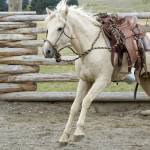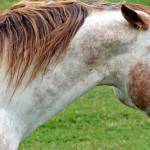Learned Helplessness in Horses: Effects on Appetite and Nutrition

Learned helplessness is a psychological state in which a horse, after repeated exposure to stress or an inability to escape negative stimuli, stops attempting to improve its situation. This phenomenon has significant implications on overall health, particularly appetite and nutritional needs.
Learned helplessness occurs when horses experience repeated exposure to stressors without control or relief. Over time, they may stop reacting to discomfort or distress, exhibiting signs such as irresponsiveness to stimuli, decreased motivation, and depressive behaviors and postures, including a flat-necked stance, wide-open unblinking eyes with a fixed gaze, and rotating ears toward the tail and holding them there.*
This condition is most observed in horses subjected to inadequate access to the “three Fs”—friends, forage, and freedom of movement. Horses are herbivores, built with a digestive tract designed to process a diet of predominantly forage obtained through freedom of movement.** Because of modern training and competition schedules, many horses are managed in ways that restrict access to these provisions.
Horses experiencing learned helplessness may have altered metabolic rates, leading to changes in dietary requirements. Stress-induced physiological responses can affect digestion, nutrient absorption, and energy expenditure. Apathy and lethargy may lead to decreased movement, thereby influencing the ability to maintain muscle mass.
A key concern with learned helplessness is its effect on appetite. Horses may show reduced interest in forage and feed, leading to weight loss and deficiencies in essential nutrients. Studies have shown that horses usually prefer sweeter feeds (higher in sucrose), but horses that displayed signs of learned helplessness have a lower intake of sucrose, hesitate to try new forage and feed, and correspondingly have an overall lower hay intake.*,+
Chronic stress can also contribute to digestive disorders such as gastric ulcers and colic, further exacerbating nutritional challenges. Caretakers may notice irregular eating patterns, prolonged feeding times, or avoidance of feed altogether.
Recognizing and reversing learned helplessness requires a multifaceted approach. Providing a consistent, positive environment with proper enrichment, gentle handling, and adequate social interaction can help improve mental state.
Nutritional rehabilitation should include high-quality forage and feeds, appropriate supplements that target specific health problems, and careful monitoring of feeding habits. Additionally, veterinary and dental consultation may be necessary to address any underlying health issues.
Learned helplessness is a serious welfare concern that can influence a horse’s physical and psychological well-being. Understanding its effects on nutrition and appetite is crucial for equine caregivers aiming to restore health and vitality in affected horses. With proper care and rehabilitation, horses can recover and regain their natural behaviors, ensuring a better quality of life.
*Fureix, C., C. Beaulieu, S. Argaud, C. Rochais, M. Quinton, S. Henry, M. Hausberger, and G. Mason. 2015. Investigating anhedonia in a non-conventional species: Do some riding horses Equus caballus display symptoms of depression? Applied Animal Behaviour Science 162:26-36.
**Verwijs, R. 2024. The horse’s behavioural and welfare needs for optimal foraging opportunities. UK-Vet Equine 8:1.
+Hall, C., D. Goodwin, C. Heleski, H. Randle, and N. Waran. 2008. Is there evidence of learned helplessness in horses? Journal of Applied Animal Welfare Science 11(3): 249–266.
This article was written by Špella Deželak, a yearlong intern at Kentucky Equine Research, and inspired by a survey conducted by the British Equine Veterinary Association. Learn more about the internship program at Kentucky Equine Research.







